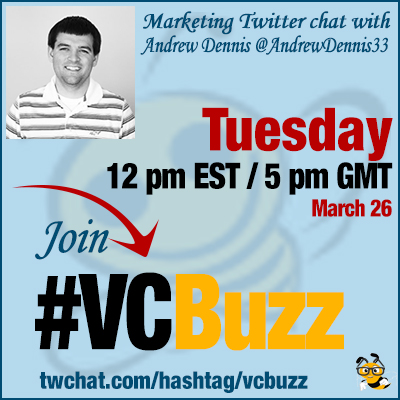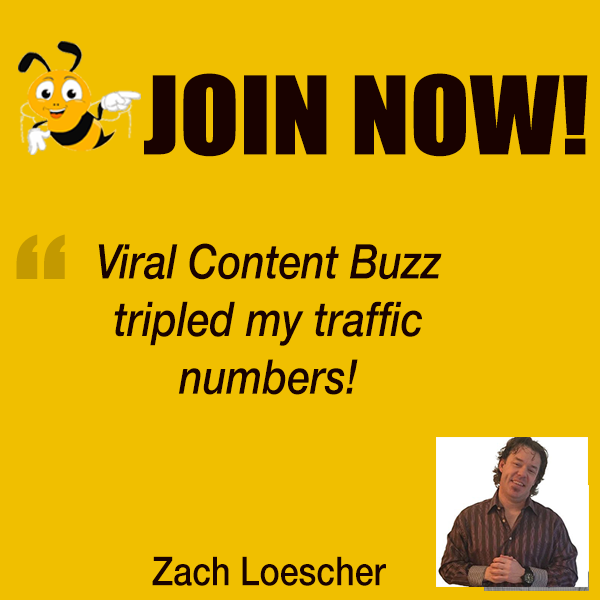 Link building is one of the hardest, yet most important digital marketing areas.
Link building is one of the hardest, yet most important digital marketing areas.
While search engine algorithms still largely depend on links, links also help build traffic and build your audience.
So how to set up an effective, yet safe link building strategy for your site? Let’s discuss!
***Add #VCBuzz chats to your calendar here.
***Please sign in here to follow the chat -> twchat.com/hashtag/vcbuzz
About @AndrewDennis33
@AndrewDennis33 is senior Content Marketing Specialist @pageonepower as well as @sengineland and @sejournal columnist.
Connect to Andrew on Linkedin
Questions we discussed
Q1 How did you become a digital marketer? Please share your career story!
Like most SEOs, I didn’t go to school to become an SEO. But I did study advertising and always had an interest in marketing.
So when I was waiting tables out of college, I jumped at the opportunity to work at Page One Power. My friend, who introduced me, described P1P as “a company that helps rank stuff online” LOL.
Now I’m ~5 years into the SEO industry and I couldn’t be happier. It’s a great community that is willing to share knowledge and support one another, and the industry is always changing so there’s never a dull moment!
Q2 On a higher level, what is a link building strategy and what does it consist of?
At a high level, link building strategy involves finding where your audience exists online and connecting your brand and website with the sites that are important to them.
A1.1: Link building is part of a growth strategy, and your approach depends on whether you want to rank highly in SERPs or set connections to build relationships. #vcbuzz
— Pitchbox App (@PitchboxApp) March 26, 2019
A2 In many ways link building is like lead generation: You want to find, nurture and convert those leads into linkers #vcbuzz
— Ann Smarty (@seosmarty) March 26, 2019
Tactically speaking, link acquisition strategy should be built on keyword research, audience search behavior, and competitive analysis.
A2 (3/3): To get started with this research, I recommend checking out this comprehensive guide our team @pageonepower built – https://t.co/ea70ZGMAzR #vcbuzz
— Andrew Dennis (@AndrewDennis33) March 26, 2019
The main thing to remember about link building strategy is it should ALWAYS align with your business goals. Ask yourself, “Does this support my overarching marketing goals?” If the answer is no, it’s not worth pursuing.
Q3 Which pitfalls should we be aware of to ensure our link building strategy is safe (both for Google and online reputation)?
One good rule to remember is link building is about application, not tactic.
Pretty much any link acquisition tactic can be used to secure relevant links or abused to the point of manipulation — it all depends on application.
Also, don’t rely on a single metric (Domain Authority, TrustFlow, Domain Rating, etc.) when assessing potential link quality. These are third-party metrics that should be referenced as signposts, not the be all end all of link value.
Always aim to add value to the real humans who use the internet, and you'll be able to sustainably build links that achieve the results you're aiming for. #vcbuzz https://t.co/1FJRs22Ykz
— Page One Power (@pageonepower) March 26, 2019
Q4 How link building has changed (should have changed) over the decade?
Oh the ways – link building has changed so much since I’ve been in the industry. There were the wild west, Pre-Penguin days where sheer link volume could cause a website to rank, regardless of spam.
After Penguin was released, it helped clean up link building quite a bit. However, the industry overreacted a bit and we saw the advent of “link earning” or “build it and they will come”.
However, SEOs quickly realized that links did not in fact build themselves, and manual promotion — within Google’s guidelines — was needed to secure the links sites need to earn search visibility.
Any time you cannot influence the link, you are fine. You built something of value, you asked – you are fine #vcbuzz
— Ann Smarty (@seosmarty) March 26, 2019
Also, the shift of Penguin from manual updates by G to updating in real time has been huge for link building. Penguin can devalue spammy, irrelevant links automatically which puts increased emphasis on real, worthwhile links.
A4: It has changed a lot. In the past, it was mostly a technical aspect of SEO (i.e., get as many links as you can, relevant or not). Now, it’s more about quality. #vcbuzz
— Pitchbox App (@PitchboxApp) March 26, 2019
There's so much content created on the web — quintillions of bytes of data each day! It can be hard to keep up. But sharing valuable content with the audiences that can benefit builds better connections. 🔗#vcbuzz https://t.co/s8LJliUB1V
— Page One Power (@pageonepower) March 26, 2019
Q5 What are your favorite link building and outreach tools?
Some of my favorite tools include @buzzstream @PitchboxApp @semrush @Majestic @Moz @ahrefs
A5 @Buzzsumo's Link Analyzer is pretty cool! It shows PEOPLE behind links (great for outreach!) #vcbuzz
— Ann Smarty (@seosmarty) March 26, 2019
However, the most important tools in link building are your creativity and ability to find and connect with relevant audiences.
Yeah! Creativity is a huge power! #vcbuzz pic.twitter.com/qZUgMWT9Qt
— Pitchbox App (@PitchboxApp) March 26, 2019
Our previous link building chats:
- How to Still Build Links (Even in Boring Niches) with @JasonAcidre #VCBuzz
- Chatting Links and Relationships with @JulieJoyce #VCBuzz
- How to Set Up an Effective Community Management Program w/ Ashley Ward @ashleymadhatter of @SEMrush #VCBuzz
- How to Incentivize Bloggers to Promote Your Site w/ Sam Charles @SamCharlesUK #VCBuzz




Leave a Reply